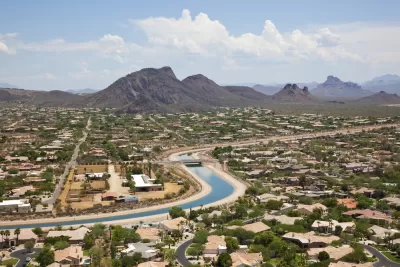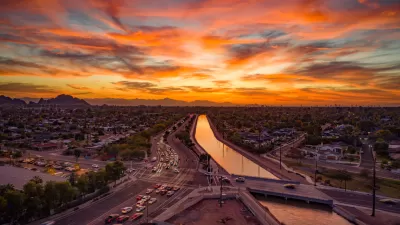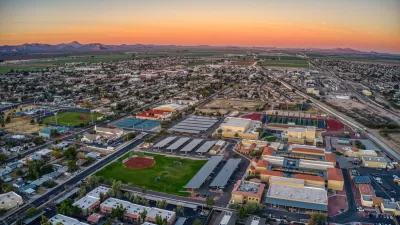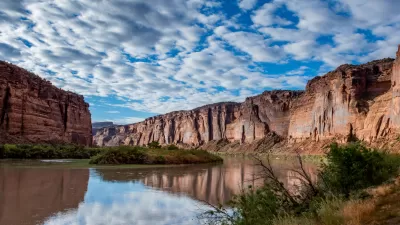Due in part to the state’s history of ‘wildcat’ real estate developments, some communities are losing access to water sources as cities and water agencies look for ways to conserve shrinking water supplies.

Expanding on the saga of the Rio Verde Foothills, an unincorporated Arizona community that recently found itself cut off from water supplies from nearby Scottsdale as part of that city’s efforts to conserve water, Sarah Tory describes the situation in High Country News, speaking with Susanna Eden, assistant director of the University of Arizona Water Resources Research Center.
Now, the 25 to 35 percent of residents who have relied on water trucked in from Scottsdale have to find new, more distant, more expensive water sources. According to Eden, this is “a textbook case on the perils of Arizona’s “wildcat” housing developments, which sidestep the state’s groundwater laws to construct homes without a fixed water supply, as well as the far-reaching implications of the worsening drought on the Colorado River.”
Rio Verde Foothills residents, Eden says, “have options they’re choosing not to pursue. They could develop a water cooperative, which would tax or levy a fee on all the members to set up a water supply service. It would mean getting permission to drill wells and building out a distribution system. Or they could negotiate with private water companies to serve the area.”
Eden suggests that reimagining growth in the desert southwest means combining a range of approaches. “That is, keep looking for more, keep using less, and keep finding ways to squeeze value out of the amount of water we have now and can use.”
FULL STORY: What happens when an affluent Arizona suburb’s main water supply is cut off?

Alabama: Trump Terminates Settlements for Black Communities Harmed By Raw Sewage
Trump deemed the landmark civil rights agreement “illegal DEI and environmental justice policy.”

Study: Maui’s Plan to Convert Vacation Rentals to Long-Term Housing Could Cause Nearly $1 Billion Economic Loss
The plan would reduce visitor accommodation by 25% resulting in 1,900 jobs lost.

Planetizen Federal Action Tracker
A weekly monitor of how Trump’s orders and actions are impacting planners and planning in America.

Waymo Gets Permission to Map SF’s Market Street
If allowed to operate on the traffic-restricted street, Waymo’s autonomous taxis would have a leg up over ride-hailing competitors — and counter the city’s efforts to grow bike and pedestrian on the thoroughfare.

Parklet Symposium Highlights the Success of Shared Spaces
Parklets got a boost during the Covid-19 pandemic, when the concept was translated to outdoor dining programs that offered restaurants a lifeline during the shutdown.

Federal Homelessness Agency Places Entire Staff on Leave
The U.S. Interagency Council on Homelessness is the only federal agency dedicated to preventing and ending homelessness.
Urban Design for Planners 1: Software Tools
This six-course series explores essential urban design concepts using open source software and equips planners with the tools they need to participate fully in the urban design process.
Planning for Universal Design
Learn the tools for implementing Universal Design in planning regulations.
Caltrans
Smith Gee Studio
Institute for Housing and Urban Development Studies (IHS)
City of Grandview
Harvard GSD Executive Education
Toledo-Lucas County Plan Commissions
Salt Lake City
NYU Wagner Graduate School of Public Service





























